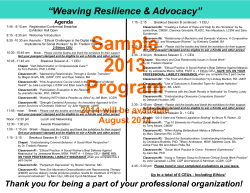
GREEN INDUSTRY - UNIDO Institute for Capacity Development
Fourth International Summer Course GREEN INDUSTRY Pathways Towards Inclusive and Sustainable Industrial Development 29 June - 10 July 2015 | Budapest, Hungary GREEN INDUSTRY Trends in resource use and energy consumption indicate that current forms of industrial production are not sustainable in the long term. Many industrial production systems continue to be inefficient and wasteful and thereby threaten to overwhelm the assimilative capacity of our planet. In order to reverse these developments, industries need to radically improve their energy efficiency, reduce their resource consumption and curb the release of harmful by-products. This calls for the development of new approaches towards industrial development. Building an inclusive and sustainable economy requires greener industries and enterprises. Substantial steps in innovation, investment, implementation and mainstreaming are necessary to improve current systems of industrial production and consumption for them to be able to actively contribute to environmental and socio-economic progress. The greening of industries and enterprises provides stability and resilience to economic development and improves job and income security, energy reliability and human wellbeing. The fourth international Summer Course “Green Industry: Pathways Towards Inclusive and Sustainable Industrial Development” organized together with the Central European University in Budapest reflects UNIDO’s genuine commitment to seeking innovative solutions and building new capacities in industrial development. CONCEPT Now running for its fourth consecutive year and with some 400 alunmi from countries all around the world, the Green Industry summer course provides participants with the opportunity to put the concept of “Green Industry” into practice and help improve industry’s environmental performance. Participants of the course will: • reflect on the technical requirements of green industrial development as well as on the strategies, policies, laws and regulations necessary for its successful implementation; • examine institutional platforms for the promotion and dissemination of resource efficient and cleaner production methods and economically viable, socially equitable and environmentally sustainable technologies; • develop strategies for a Green Industry in line with socioeconomic and environmental goals and targets. The course is targeted at young professionals in the fields of Resource Efficient and Cleaner Production (RECP), members of non-governmental organizations involved in environmental advocacy, and PhD students Green Industry with a background in technical policy and practice or policy related studies in Resource use and Green Industry. It addresses resource efficiency individuals in industry or in Industrial energy efficiency for institutions assisting small sustainable wealth creation and medium-sized enterprises (SMEs) with the implementation of RECP methods, environmental management systems (EMS), low carbon measures and eco-designs. Sustainable development challenges and opportunities Participants are expected to have an academic background and/or practical knowledge of environmental management systems, Green Industry, resource efficiency as well as of the global and national policy frameworks for green industrial development. COURSE DESIGN The course is based on a genuinely interdisciplinary approach. It sets out with a one-month preliminary distance learning component which ensures that all participants share a common knowledge base concerning issues of Green Industry and resource efficiency. • • • • obligatory and optional readings facilitated online discussion case study assignments online test E-LEARNING weeks • • • • 1 2 IN-RESIDENCE 3 4 5 forum and a shared virtual workspace complement the programme. Participants will be encouraged to apply environmental and environment-related management methods and tools in support of Green Industry. lectures & webinars exercises and simulations group work & presentations field trip & public lectures Active engagement in online discussions, an in-depth case study prepared by participants related to green industry and their company/organization, industry and/or specific country context and a multiple choice test form the selection process for the face-to-face component of the course. Seminars and group discussions will foster lively debate on case studies while peer reviews and practical exercises will increase participants’ skills and effectiveness in designing and implementing policies, strategies and projects related to sustainable industrial development. The two-week residential part of the course offers a dynamic mix of lecture-based and participatory teaching methods. A database of key literature and case studies, a discussion For the final assignment, participants will be required to develop a Green Industry strategy or transition plan for a particular region, organization, company or sector. COURSE DETAILS Place: Date: Central European University, Nador u. 9, 1051 Budapest, Hungary. Phone: +36-1 327-3811, Fax: (36-1) 327-3124, E-mail: summeru@ceu.hu, Internet: http://www.ceu.hu 29 June - 10 July 2015 Participants: The number of participants for the in-residence part of the course is limited to 25 persons. Participants will be selected based on their performance in the online part of the course. Gender and geographic balance will be taken into consideration. Application: Full information on eligibility and application requirements is available at www.summer.ceu.hu/green-2015 Women are especially encouraged to apply. Please submit applications by 20 February 2015. Course Fee: The standard tuition fee is EUR 550.* Accomodation: Participants will be accommodated in single rooms including bathroom at the CEU Residence Center, a modern, airconditioned hostel, for EUR 28 per night.* Living Expenses: Information on living expenses is available at www.summer.ceu.hu Certificate: A certificate of completion will be awarded to all those who participate in all components and successfully complete all course requirements. Preparation: Participants are required to prepare a case study on issues related to green industry and their company/organization, industry and/or specific country context. The case study also serves as preparation for those who are invited to participate in the in-residence component. Course faculty: Jacek Cukrowski, UNIDO Laszlo Pinter, CEU Pradeep Monga, UNIDO Zoltan Illes, CEU Edward Clarence-Smith, UNIDO Markus Wolf, FHNW * All applicants from developing countries are eligible to apply for financial aid. The course is supported by the United Nations Industrial Development Organization (UNIDO). Institute for Capacity Development Summer University Central European University, Budapest The course is organized by the UNIDO Institute for Capacity Development in cooperation with the Central European University (CEU) and the University of Applied Sciences and Arts Northwestern Switzerland (FHNW) as well as with support from the Swiss State Secretariat for Economic Affairs. It will be offered as part of the CEU Summer University. To apply, please visit the website of CEU Summer University and follow the instructions for the application procedure: www.summer.ceu.hu/green-2015 For further information on this programme please contact us or visit our website: UNIDO Institute for Capacity Development Vienna International Centre, P.O. Box 300, 1400 Vienna, Austria Telephone: (+43-1) 26026-3391, Fax: (+43-1) 26026-3373 E-mail: unido-institute@unido.org institute.unido.org UNITED NATIONS INDUSTRIAL DEVELOPMENT ORGANIZATION Vienna International Centre, P.O. Box 300, 1400 Vienna, Austria Telephone: (+43-1) 26026-0, Fax: (+43-1) 26026-69 E-mail: unido@unido.org, Internet: http://www.unido.org Green Industry
© Copyright 2025
















